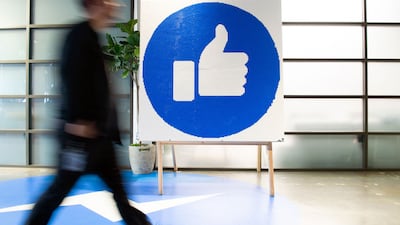Facebook lost an important friend when its former employee, Frances Haugen, broke ranks to turn whistleblower and reveal the dangerous reality of the company today. Her testimony captured attention across the world, but hers has not been the only one. Less famous is the story of a Dubai-based employee, who in May shared documents showing a sharp decline in trust for Facebook among its users in the Middle East.
In a bid to contain the fallout from such cases, Mark Zuckerberg, Facebook's chief executive, is rumoured to be considering a rebranding, including a name change, for the company at its annual developer conference, to be held this year on October 28.
It may be little more than a superficial gesture. Similar moves in the past have failed to address core issues that today make not only Facebook, but other social media companies appear to be a growing threat to societal well-being.
And anyway, users are unlikely to be fooled. Global data show that, year on year, Facebook’s social networking platform has been falling out of favour. What makes the Dubai employee's revelations important is that it showed quite how much confidence is being lost in a part of the world that should be its biggest fan. The Middle East has a large young, connected and entrepreneurial population. So why are people switching off?

One reason is that social media-savvy youth are good at spotting hypocrisy. Accusations that Facebook and its sister company Instagram unfairly censored pro-Palestinian material throughout May's violence in Palestine and Israel caused, according to the report, a major dent to the organisation's reputation. And earlier this week, a major study found that nearly half of 18-20-year-olds in the Mena region have suffered online abuse and exploitation, much of which will have been funnelled through social media.
Ten years ago, the status of these platforms in the region was very different. Iran's Green Movement in 2009 was dubbed the "Twitter Revolution", and images of women refusing to abide by government-imposed dress codes garnered support across the globe on Facebook. Many still believe that the speed and breadth of social media was central to the Arab uprisings of 2011.
It is this simple purpose, built around enabling easy communication, that Facebook should return to if it wants to rebuild trust. The early zeitgeist of the social media movement was a forward-looking one, which looked as though it would be at the heart of creating a better future. Those days are over, for now, but they should be revisited. Doing this will require Mr Zuckerberg ditching name changes and rediscovering the good of which his technologies are capable.
In reality, Facebook is likely to go ahead with the rebrand and is even rumoured to be announcing a new "metaverse" concept, in which it would seek to fully hybridise the physical and virtual worlds, embedding itself even more intimately into users’ personal lives.
Very little of Facebook’s power lies in the name. Rather, it is in the increasingly unaccountable, and monopolising character that the platform is taking on. Still, in the real world, consumers prefer simplicity – at least, for now. For example, in the Middle East, trust in WhatsApp, Facebook’s most straightforward product, remains persistently high. Facebook has succeeded in connecting the world and should work to regain its trust. Until social media giants do this, people with the most to gain from the technology may simply log off.


